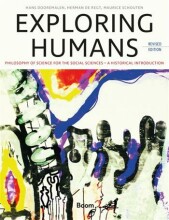Summary: Exploring Humans Philosophy Of Science For The Social Sciences : A Historical Introduction | 9789024441112 | Hans Dooremalen, et al
- This + 400k other summaries
- A unique study and practice tool
- Never study anything twice again
- Get the grades you hope for
- 100% sure, 100% understanding
Read the summary and the most important questions on Exploring Humans Philosophy of Science for the Social Sciences : a Historical Introduction | 9789024441112 | Hans Dooremalen; Herman C. D. G. de Regt; Maurice Kenneth Davy Schouten
-
1 Introduction and the philosophers of the Antiquity
This is a preview. There are 9 more flashcards available for chapter 1
Show more cards here -
What are the two approaches and names Greek philosophers in the antiquity, about how to find truth in life and science?
- Plato's Rationalism
- Aristotle's Empirism
- Plato's Rationalism
-
1.3 Plato's Rationalism
This is a preview. There are 8 more flashcards available for chapter 1.3
Show more cards here -
Why did Plato think that human perception is misleading?
Our perception changes over time as we grow older or have new experiences (think of Plato's Cave). -
What did Plato's rationalism claims?
1) True knowledge depends on rationality, not on information that comes through our senses (perception)
2) Truth/knowledge must be about how things really are -
Who said "The essence of reality is change" and how does it relate to Plato's Rationalism?
Heraclitus (Greek Philosopher). - Because our reality (
perception )changes , we can only find trueknowledge by usingrationality .
-
Who said the following notion and how does it relate to Plato's Rationalism: "Reality is unchanging, but appears as changing to our senses".
- Parmenides (uit de dialogen van Plato).
- Even though the reality stayed the same, our senses think it changed. Therefore we cannot rely on senses and have to use rationality to find true knowledge (which is the main idea of Plato's Rationalism).
- Parmenides (uit de dialogen van Plato).
-
How does Plato explain that humans have the capacity to find true knowledge by reasoning?
He states that truth is only found in the World of forms. The human soul comes from this place and has seen the truth, but forgot about it when it got reincarnated. Thus we posses the right answers but have tot deduct them through reasoning. -
Why did Plato think that truth can only be found in the supernatural World of Forms and not around us on earth.
Only in the (abstract) World of Forms can you find things that are perfect. Everything in our own world are less than perfect manifestations of the true forms.
E.g., No angle in our world can be exactly 90.00 degrees. This is only possible in an abstract world. -
What is the dialogue Meno?
Plato tries to explain how you can recollect the knowledge about forms. -
What does Kosuth's 3 chairs (1965) tell us about Rationalism?
They show that three different perceivable manifestations represent the same thing. Only reasoning offers answers to what it is. -
How does Plato's Rationalism differ from the modern definition of Rationalism?
Plato's Rationalism is more spiritual than our modern definition. In Plato's version, human souls come from a spiritual World of Forms which explains why we have all the answers if we deduct them by using reasoning.
- Higher grades + faster learning
- Never study anything twice
- 100% sure, 100% understanding
Topics related to Summary: Exploring Humans Philosophy Of Science For The Social Sciences : A Historical Introduction
-
Inleiding en antieke filosofen - Plato's Rationalism
-
Inleiding en antieke filosofen - Aristotle's Empiricism
-
Inleiding en antieke filosofen - Induction / Deduction
-
Inleiding en antieke filosofen - Aristotle's Problem
-
Beyond the Pillars of Hercules: A new Philosophy of Science
-
The impact of Descartes and the British empiricists on philosophical thought regarding rationality and empiricism - Descartes
-
The impact of Descartes and the British empiricists on philosophical thought regarding rationality and empiricism - British empiricists
-
Understanding Humans: Positivism and Hermeneutics

































